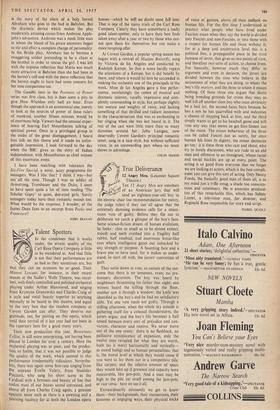Talent Spotters
IN the conditions that it works under, the erratic quality of the Carl Rosa Opera Company is little to be wondered at. And that little is not that their performances are as bad as they sometimes are, but that they can on occasion be so good. Their Manon Lescaut, for instance, in their recent season at the Sadler's Wells Theatre, was excel- lent, with finely controlled and polished orchestral playing under Arthur Hammond, and singing from Krystyna Granowska and Charles Craig of a style and vocal beauty superior to anything normally to be heard in this theatre, and equal to the very best that the resident company at Covent Garden can offer. They deserve our gratitude, too, for putting on this opera, which until their revival of it last year had not been in the repertory here for a good many years. Their new production this year, Benvenuto Cellini, is still more enterprising, not having been Played in London for over a century. Here the orchestral playing was so poor, and the produc- tion so feeble, that it was not possible to judge the quality of the work, which seemed in this Performance irredeemably ridiculous. Neverthe- less, there was again some first-rate singing from the soprano Estelle Valery, from Stanislav Pieczora, who sang his short scene as the Cardinal with a firmness and beauty of line that makes most of our basses sound untrained, and above all from Charles Craig again, a genuine operatic tenor such as there is a yawning and a Yearning vacancy for'at both the London opera houses—which he will no doubt soon fall into. That is one of the many trials of the Carl Rosa Company. Clearly they have somewhere a really good talent-spotter, only to have their best finds taken away after a year or two by those who can- not spot them for themselves but can make a more tempting offer.
At Covent Garden, a popular spring season has begun with a revival of Madam Butterfly, sung by Victoria de los Angeles and conducted by Rudolph Kempe. So thin a score hardly repays the attentions of a Kernpe, but it did benefit by them, and where it would let him he succeeded in making the orchestra one of the principals in 'the work. Mme de los Angeles gave a fine perfor- mance, unrelaxingly the centre of musical and dramatic interest, vocally impressive and com- pletely commanding in style, but perhaps slightly too mature and weighty of voice, and lacking something of that thrilled and radiant innocence in the characterisation that was so enchanting in her singing when she was last heard in it. The rest of the cast were little more than so many dummies around her. John Lanigan, now deservedly Covent Garden's principal romantic tenor, sang in a nice style, but without sufficient voice, in an unrewarding part where no tenor shows to advantage.
COLIN MASON






























 Previous page
Previous page